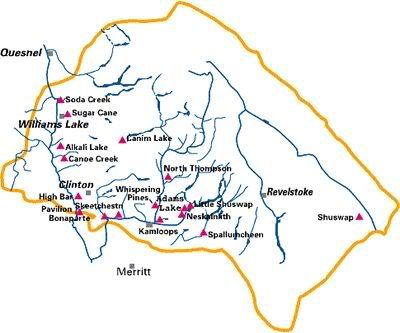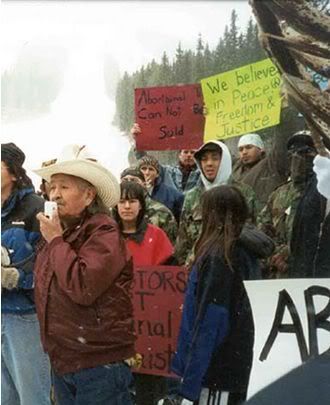A Neglected Obligation
Monday, August 30, 2004; Page A22
HEALTH CARE for many Native Americans in this country sinks to Third World levels. According to a draft report by the U.S. Commission on Civil Rights, deaths from alcoholism are 770 percent more likely among Native Americans than the general population; from tuberculosis, 650 percent; and from diabetes, 420 percent. In some tribes, one in two people suffer from diabetes. The Indian Health Service, primary health care provider for more than 1.6 million members of federally recognized tribes, is so underfunded that it spends only $1,914 per patient per year, about half of what the government spends on prisoners ($3,803) and far below what is spent on the average American ($5,065). Funding is so low that to be transferred out of an IHS facility for specialized treatment a patient must be in danger of losing a life or limb.
The Bush administration and Congress could help, but they have been sitting for almost four years on a revamped Indian Health Care Improvement Act. The original bill, enacted in 1976, is the cornerstone law that directs health care resources to Native Americans; it expired in 2001. Congress has been appropriating money year to year since then, but the strategy for providing health care for Native Americans is in dire need of a wholesale update, which the neglected bill would provide. Developed by tribal leaders themselves for the first time, the legislation would authorize Congress, among other things, to help Indian reservations recruit health professionals and specialists, expand preventive and behavioral health programs -- an important step in helping to combat alcoholism -- and give tribes more say in decision making. But only after long delay did Tommy Thompson, secretary of health and human services, finally agree last month to make this act a priority and work with congressional staffers to iron out remaining issues. Mr. Thompson and Congress should be kept to their promise of passing this legislation before the end of this session.
full article email=coloradoaim@yahoo.com password=colorado
Column: Tribes, Iraqis have sovereignty issues in common
By JODI RAVE Lee Enterprises
A popular T-shirt in Indian Country these days shows Geronimo and his band brandishing rifles, looking mean and tough. The heading over the picture reads: "Homeland Security." The slogan under the photo: "Fighting Terrorism Since 1492."
It's an obvious play on U.S. policy since Sept. 11 - policy that led, in part, to the U.S. occupation of Iraq. But a more a apt comparison could be made between Native people and Iraqis.
Both are subject to U.S. definitions of sovereignty. And if Native history can be a guide, the Iraqi people should be worried.
A few centuries of Washington-led efforts to eliminate, restore and then chip away at tribal sovereignty have reduced formerly self-governing tribes to quasi-sovereign nations. Their remaining independence is frequently trumped by state and federal interests.
full article
Texas appropriate location for American Indian Genocide Museum (Part two)
Posted: August 30, 2004 - 3:17pm EST
by: Brenda Norrell / Southwest Staff Reporter / Indian Country Today
HOUSTON - There was no state that surpassed Texas in the genocide of American Indians. Now, it is here in Texas that the American Indian Genocide Museum is documenting the American holocaust.
"They were run out of Texas," said Steve Melendez, Pyramid Lake Paiute of Nevada, now living in Texas and president of the museum. "We are really sitting on a powder keg here in Texas."
Melendez said the museum is retelling Indian history and hopes it will lead authors to rewrite textbooks without bias. "It seems like the Indian side of the story has never been told. They would rather live in this sanitized view of history."
The payment for Indian scalps, including the scalps of Indian children, was written in the laws of Massachusetts. "The Acts and Resolves of the Province of Massachusetts Bay," Vol. I, states the rate for Indian scalps began at 50 pounds. The price for the scalp of Indian children under 10 was 10 pounds of silver.
full article
Watered down sacred sites bill passes California Senate
Posted: August 30, 2004 - 3:14pm EST
by: James May / Indian Country Today
SACRAMENTO, Calif. - Lost in the shadows of recent news regarding tribal compacts and other legislation, the California Senate voted 68 - 4 in favor of legislation that would require developers and landowners to consult with tribes early in the planning process for proposed developments. Other than a few formalities, the legislation is headed to Gov. Arnold Schwarzenegger’s desk for dismissal or approval.
"This was a long-fought bill, and I am proud to have worked alongside so many California tribes to help protect vitally important sacred sites. I encourage Gov. Schwarzenegger to sign this bill," said Senate President Pro Tem and the bill’s author Sen. John Burton, D-San Francisco.
Four Republicans voted against the bill including Sen. Roy Ashburn, Sen. Samuel Aanestad, Sen. Bill Morrow and Sen. Ross Johnson. Calls to all four opponents’ offices were not returned though press reports indicate that they were concerned with private property rights.
full article
State too quick to take Native children
The Edge of the Village
Ernestine Hayes
The 1978 Indian Child Welfare Act was heralded as a powerful weapon in the fight for Indian self-determination. Before passage of that historic act, it was the custom for American Indian and Alaska Native children to be removed from their families and placed in non-Native homes, echoing the colonialist practice effected by the widespread forcing of Indian children into boarding schools. ICWA was meant to correct those wrongs.
In 1997, Congress addressed the problem created by persistent cases in which children often spent years in foster care. The federal Adoption and Safe Families Act, set as Alaska law in 1998, fixed a 15-out-of-22-month limit for the period a child can remain in foster care before termination of parental rights is initiated. In certain circumstances, ASFA also pays the state a $4,000-$6,000 bonus for completed adoptions. This legislative step has given caseworkers an avenue through which they can now dispense with the special protections intended by ICWA.
full article
Eskimo traditions melt away with every generation
Marriages were far more complex than just saying, 'I do'
Sarah Kershaw, New York Times Sunday, August 29, 2004
Gambell , Alaska -- When it became clear that the elders in this isolated Eskimo village on St. Lawrence Island in the Bering Sea approved of the marriage, Clifford Apatiki's relatives did what was required of them: They bought him his bride.
That meant, according to a fast-fading custom among the Siberian Yupiks, a small but sturdy native Alaskan tribe that has inhabited this treeless and brutally windy island since about A.D. 500, that Apatiki's family would spend at least a year coming up with the payment. They called on their relatives, here in Gambell, over in Savoonga, the other Yupik village on this island 38 miles from the Chukchi peninsula in Russia, and across Alaska, to send them things -- sealskins, rifles, bread, a toaster -- a house full of gifts.
When the bride's family accepted the offerings, Apatiki, a skilled ivory carver and polar bear hunter, did what was required of him: He went to work for her family as a kind of indentured servant for a year, hunting seal, whale and polar bear, and doing chores around the house.
full article
Concern grows over diabetes in Indians
Jason B. Johnson, Chronicle Staff Writer Saturday, August 28, 2004
About 500 health care advocates from across the nation are expected to gather today near a reservation in Santa Rosa for a daylong conference on combating the spread of diabetes among Native Americans.
Approximately 12 percent of the Native American population nationwide has Type 2 Diabetes, experts say. For some tribes, including the Comanche, Cherokee, Kumeyaay, and Pima, the rate is as high as 50 percent.
The event, organized by the group Taking Control of Your Diabetes, will examine ways to combat the disease, which can lead to blindness, kidney failure and stroke.
"Diabetes is increasing in all populations within the United States, and American Indians have been hit hardest of all populations in this country," said Donald Warne, a Native American and physician at the School of Health Management and Policy at the W.P. Carey School of Business at Arizona State University.
full article
Diabetes Rampant Among Native Americans
By Amanda Gardner
HealthDay Reporter
MONDAY, Aug. 30 (HealthDayNews) -- Sally Van Haren was adopted out of her native San Carlos Apache tribe as an infant and raised by a white family.
"I was always kind of bummed that I missed out on the culture, traditions and language," she said. "When I participated, I felt odd."
Now 36, van Haren has unexpectedly discovered a common bond with the rest of her tribe: diabetes.
Type 2 diabetes is rampant among Native American populations, with as many as half of the adults in some tribes suffering from the disease, said Dr. Donald Warne, a clinical professor in the School of Health Management and Policy at Arizona State University's W.P. Carey School of Business in Tempe. Warne, who is a Lakota Indian from South Dakota, treats patients on a reservation south of Phoenix that has the highest rate of type 2 diabetes in the world.
According to the National Institutes of Health, roughly 15 percent of Native Americans in the United States have this disease, which can rob them of their eyesight, their limbs, their kidneys and eventually their lives. They are 2.6 times more likely to have diagnosed type 2 diabetes than non-Hispanic whites.
That is a radically changed picture from the early part of the 19th century, when health surveys of Southwestern tribes found only one documented case of diabetes, Warne said.
full article
Zapatistas Amend Laws on Trafficking Drugs & Immigrants
By Al Giordano,
Posted on Mon Aug 30th, 2004 at 01:35:56 PM EST
Marking the first year since the formation of "Good Government Councils" in Zapatista territory, the spokesman of Mexico's Zapatista Army of National Liberation (EZLN, in its Spanish initials), Subcomandante Marcos, issued an eight-part set of communiqués and progress reports to the national and international public this month.
The communiques (plus translations of each to English by Irlandesa) appear on the newswire at Chiapas Indymedia.
Of certain interest here is the 5th part, titled Five Decisions of Good Government, which is prefaced:
During the first year of the Good Government Juntas, some internal accords were formalized, which were adopted some time ago now, and new decisions were defined. They have to do with conservation of the forests, drug trafficking, trafficking in the undocumented, the movement of vehicles in the regions and state elections for municipal presidents and the state Congress. full article
Tibet activists plea for rights progress before 2008
BEIJING, Aug 30 (Reuters) One day after the Olympic flag was passed to Beijing, activists campaigning for better human rights in Tibet urged the International Olympic Committee (IOC) to pressure China to improve its record.
At an unlikely news conference in Beijing, host of the 2008 Summer Games, representatives of overseas groups that support calls for more autonomy for Tibet said the IOC should warn China that its right to host the games would be revoked if there is no improvement in its human rights' record.
''The IOC should further establish benchmarks to determine the basis for an eventual reconsideration of the location of the 2008 Olympics in the event of a lack of improvement or further deterioration of the human rights situation in China and Tibet,'' said Paul Bourke, of the Australia Tibet Council.
full article
Hear the Wounded U.S. Lion Roar
by William Thorsell
With the ultimately boring Olympic Games behind us, we can turn again to the far more satisfying melodrama of a major political convention -- where winning or losing matters to history.
The Republicans are descending on Democratic New York City almost three years after the humiliation of 9/11. The barbarian invasion meets the decline of the American Empire.
In Denys Arcand's film The Barbarian Invasions, the reference is to 9/11, and more. You could describe the Saudis who flew those kamikaze planes as barbarians, but the historical reference goes back to Rome. The barbarians sacked impregnable Rome, defeated it, and plunged Western civilization into a long night of forgetfulness.
In Mr. Arcand's film, there are many suggestions that, like Rome, our culture has become decadent enough to be vulnerable to barbarians, however unworthy they may be. Most barbarians have the vigour of their appetites, if not the courage of their convictions. The barbarians who savaged America on 9/11 had the courage of their convictions, too.
full article
Protecting the President from Dissent
by Christopher Brauchli
We must not confuse dissent with disloyalty.
— Edward R. Murrow
As the nation eagerly watches to see what techniques are employed at the Republican National Convention to keep protesters out of sight if not out of mind, we are reminded that President Bush's fondness for smiley faces has been a hallmark of his administration.
The only difference between then and now is that whereas until recently the suppression of frowning faces at presidential appearances was effected by removing them from where Mr. Bush might see them, today they are being encouraged to stay at home.
A protester, especially one with a sign, detracts from the president's message that Bush is in the White House and all is right with the world. Examples abound of the great care taken to protect the president from signs of dissent.
full article







